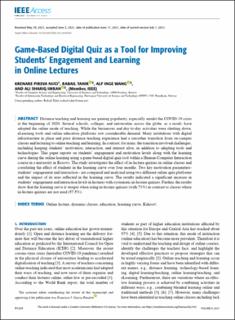| dc.contributor.author | Pireva, Krenare | |
| dc.contributor.author | Tahir, Rabail | |
| dc.contributor.author | Wang, Alf Inge | |
| dc.contributor.author | Imran, Ali Shariq | |
| dc.date.accessioned | 2021-10-27T08:51:23Z | |
| dc.date.available | 2021-10-27T08:51:23Z | |
| dc.date.created | 2021-06-14T14:44:25Z | |
| dc.date.issued | 2021 | |
| dc.identifier.citation | IEEE Access. 2021, 9 91220-91234. | en_US |
| dc.identifier.issn | 2169-3536 | |
| dc.identifier.uri | https://hdl.handle.net/11250/2825899 | |
| dc.description.abstract | Distance teaching and learning are gaining popularity, especially amidst the COVID-19 crisis at the beginning of 2020. Several schools, colleges, and universities across the globe, as a result, have adopted the online mode of teaching. While the businesses and day-to-day activities were shutting down, eLearning tools and online education platforms saw considerable demand. Many institutions with digital infrastructure in place and prior distance teaching experience had a smoother transition from on-campus classes and lecturing to online teaching and learning. In contrast, for many, the transition involved challenges, including keeping students’ motivation, interaction, and interest alive, in addition to adapting tools and technologies. This paper reports on students’ engagement and motivation levels along with the learning curve during the online learning using a game-based digital quiz tool within a Human-Computer Interaction course in a university in Kosovo. The study investigates the effect of in-lecture quizzes in online classes and correlating the effect of students in the learning curve over four months. Two key motivation parameters-students’ engagement and interaction - are compared and analyzed using two different online quiz platforms and the impact of its uses reflected in the learning curve. The results indicated a significant increase in students’ engagement and interaction levels in lectures with systematic in-lecture quizzes. Further, the results show that the learning curve is steeper when using in-lecture quizzes (with 73%) in contrast to classes where in-lecture quizzes are not used (57.5%). | en_US |
| dc.language.iso | eng | en_US |
| dc.publisher | Institute of Electrical and Electronics Engineers (IEEE) | en_US |
| dc.rights | Navngivelse 4.0 Internasjonal | * |
| dc.rights.uri | http://creativecommons.org/licenses/by/4.0/deed.no | * |
| dc.title | Game-based digital quiz as a tool for improving students’ engagement and learning in online lectures | en_US |
| dc.type | Peer reviewed | en_US |
| dc.type | Journal article | en_US |
| dc.description.version | publishedVersion | en_US |
| dc.source.pagenumber | 91220-91234 | en_US |
| dc.source.volume | 9 | en_US |
| dc.source.journal | IEEE Access | en_US |
| dc.identifier.doi | 10.1109/ACCESS.2021.3088583 | |
| dc.identifier.cristin | 1915637 | |
| cristin.ispublished | true | |
| cristin.fulltext | original | |
| cristin.qualitycode | 1 | |

